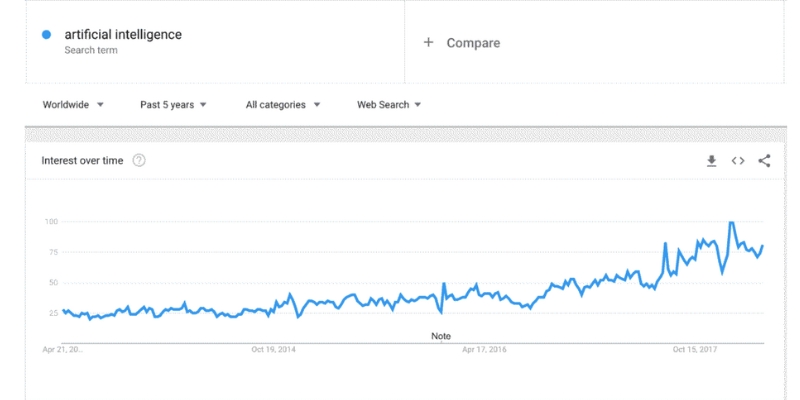Lucia Lee
Last update: 01/12/2024
Behind every successful business lies a supply chain that runs like clockwork - efficient, predictable, and adaptable. But in today’s fast-changing market, keeping it that way is far from easy. That’s where AI in supply chain management comes in. While traditional businesses struggle with fluctuating demand, global disruptions, and rising customer expectations, forward-thinking companies are using AI to transform every stage of their operations. Keep reading to discover how AI is reshaping supply chain management - and why it’s becoming a game-changer for businesses like yours.
Artificial intelligence (AI) in supply chain management refers to the use of intelligent technologies to enhance how goods are produced, stored, and delivered. At its core, AI enables machines to perform complex tasks that usually require human intelligence - such as analyzing data, learning from patterns, and making informed decisions in real time. By processing vast amounts of data from across the supply chain, AI helps businesses forecast demand more accurately, optimize inventory levels, and streamline logistics operations.
Unlike traditional software that follows fixed rules, AI systems - especially those powered by machine learning - continuously learn from new data and improve over time. This allows them to identify hidden patterns in market behavior, suggest cost-effective delivery routes, and even detect inefficiencies in production or warehouse workflows before they escalate. Ultimately, AI transforms the supply chain from a reactive process into a proactive, data-driven ecosystem that enhances speed, accuracy, and resilience in an increasingly complex global marketplace.

AI in supply chain management
AI has become a driving force behind smarter, faster, and more efficient supply chains. Let’s explore how AI transforms every stage of the supply chain, helping businesses stay competitive in an increasingly dynamic market.
Demand forecasting and inventory optimization
One of the most impactful uses of AI in supply chain management is predicting demand with greater precision. By analyzing historical sales data, market trends, and external factors such as weather or economic shifts, AI systems can forecast customer demand more accurately than traditional models. This allows businesses to fine-tune their inventory levels to reduce both overstocking and stockouts. As a result, businesses can lower storage costs while maintaining high product availability and customer satisfaction.
Warehouse automation and management
AI-powered robotics and warehouse management systems (WMS) are revolutionizing fulfillment operations. Robots handle repetitive tasks such as picking, sorting, and packing, while AI analyzes product movement to suggest the most efficient storage layouts. These innovations help businesses enhance productivity, improve space utilization, and cut operational costs.
Route optimization and transportation management
AI in supply chain management optimizes logistics by analyzing real-time data such as traffic, weather, and fuel usage to recommend the most efficient delivery routes. In ecommerce, AI enhances last-mile delivery by automatically assigning the nearest vehicle or drone, improving delivery times and customer experience while reducing transportation costs.

Route optimization
Predictive maintenance
AI-driven predictive maintenance uses IoT sensors and data analytics to detect potential equipment failures before they occur. Logistics providers like DHL leverage this technology to monitor vehicle performance and schedule maintenance proactively, preventing costly breakdowns and downtime. This predictive approach extends equipment lifespan, boosts reliability, and reduces maintenance expenses.
Real-time visibility and tracking
With AI-powered tracking systems, companies gain full visibility into their supply chains. These tools monitor the location, condition, and progress of goods in real time, allowing businesses to respond quickly to disruptions. AI assistants also enable customers to track shipping status and receive proactive updates, ensuring transparency and trust across the logistics process.
Supplier relationship management
AI in supply chain management enhances supplier management by analyzing performance metrics such as cost efficiency, delivery reliability, and product quality. Platforms like IBM’s AI-driven Supply Chain Insights help companies assess supplier risks and make smarter sourcing decisions. With these insights, businesses can strengthen supplier relationships, reduce disruptions, and ensure consistent product flow.
Dynamic pricing and procurement optimization
AI systems can also optimize procurement by evaluating supplier data, material costs, and market conditions. Companies can use AI to streamline sourcing decisions and negotiate better contracts. At the same time, AI-driven pricing models analyze demand and competitor behavior to recommend dynamic pricing strategies that boost profitability while staying competitive.

Dynamic pricing
Reverse logistics and returns management
AI simplifies the complex process of handling product returns - an especially critical area for ecommerce. By analyzing return patterns, AI can recommend whether an item should be restocked, refurbished, or recycled. Effective returns management ensures minimal waste, lower costs, and a smoother customer experience.
Digital twins for supply chain modeling
Digital twin technology is another innovative application of AI in supply chain management. It creates virtual replicas of supply chain systems, allowing businesses to simulate different scenarios - such as supply disruptions or sudden demand surges - before they happen.
For businesses implementing AI in supply chain management, the benefits go beyond automation. Here are the key benefits that make AI a game-changer for supply chain management.
Lower operating costs
AI automates time-consuming, repetitive tasks such as tracking inventory, monitoring supplier performance, and updating delivery schedules. By identifying inefficiencies and mitigating bottlenecks, it helps organizations minimize labor costs and resource waste. AI systems can even conduct supplier price comparisons and recommend better sourcing options, ensuring every dollar spent contributes to efficiency and profitability.
Advanced, real-time decision-making
Instead of reacting to problems, AI empowers supply chain leaders to make proactive decisions. By analyzing historical and real-time data, AI in supply chain management detects market shifts, forecasts demand fluctuations, and alerts businesses to potential disruptions - whether due to supplier issues or external factors like weather. This end-to-end visibility enables faster responses, optimized planning, and improved operational continuity.
Improved accuracy and reduced waste
AI excels at spotting patterns and anomalies that humans might overlook. In warehouses and production lines, it detects product defects or employee errors early, helping prevent costly mistakes and waste. Integrated with ERP systems, AI automates quality checks, documentation, and data entry - reducing manual errors and enhancing overall supply chain accuracy and reliability.
Smarter inventory management
AI-driven systems monitor stock levels, adjust replenishment automatically, and reallocate resources between warehouses. By combining real-time sales data with predictive analytics, AI ensures that products are always available when customers need them - without tying up excess capital in overstock. This precision not only cuts fulfillment costs but also strengthens customer satisfaction.

Smarter inventory management
Enhanced warehouse and logistics efficiency
AI improves warehouse operations by optimizing floor layouts, guiding robotic systems, and forecasting which items need to be placed for faster picking. In logistics, AI analyzes traffic, vehicle performance, and delivery schedules to recommend the most efficient routes, cutting fuel consumption and shortening transit times. The result is faster, more cost-effective, and reliable delivery performance.
Enhanced customer experience
AI-driven customer service tools such as chatbots and real-time tracking systems keep customers informed and supported throughout the delivery process. FedEx, for instance, uses AI to provide shipment updates and accurate delivery predictions, building trust and encouraging repeat purchases. By ensuring speed, transparency, and personalization, AI transforms logistics into a key part of customer satisfaction.
Greater sustainability
AI in supply chain management nudges businesses toward sustainability goals by minimizing waste and reducing emissions. Predictive models optimize truckloads and delivery routes, cutting unnecessary fuel use, while accurate demand forecasting prevents overproduction and excess inventory. These improvements not only benefit the environment but also reduce costs and enhance corporate reputation.
Optimized operations through simulation
Using AI-powered simulations and digital twins, supply chain managers can model different “what-if” scenarios - such as shifting suppliers or relocating warehouses - before making real-world changes. This enables data-driven planning, better risk management, and continuous performance improvement without disrupting operations.

Optimized operations through simulation
Despite the transformative potential and widespread enthusiasm for AI in supply chain management, companies encounter several key challenges during implementation that need to be carefully managed for success.
Downtime for training
Introducing new AI technologies into supply chain operations requires employees to undergo comprehensive training to understand and effectively use these tools. This training often necessitates temporary pauses or slowdowns in regular workflows, resulting in unavoidable operational downtime.
To mitigate disruption, managers must meticulously plan training sessions, potentially scheduling them incrementally or during low-demand periods to minimize adverse impacts on productivity. Effective change management and communication are also essential to foster employee engagement and smooth transitions.
Cost of implementation
The financial burden of AI adoption in the supply chain can be substantial. Beyond the acquisition of AI software and machine learning models, businesses often need to invest in upgrading IT infrastructure, integrating AI with legacy systems, and ongoing system maintenance. While AI can lead to significant cost savings in the long term through efficiency gains and waste reduction, the upfront capital and resource allocation required for setup pose a significant barrier, particularly for small and medium-sized enterprises.
Conducting a thorough cost-benefit analysis and exploring phased implementations or partnerships with technology providers can help manage these expenses.
Complex systems
Global supply chains are inherently complex, involving multiple stakeholders, regional regulations, and dynamically changing variables. Implementing AI at this scale demands systems that can process massive, diverse data streams in real time and adapt to evolving operational conditions.
Supply chain planners and operators must continuously update their knowledge and skills to navigate new AI tools and algorithms effectively. This ongoing learning curve can hinder rapid adoption and requires investment in workforce development and cross-functional collaboration.
Data quality and availability
AI solutions rely heavily on access to accurate, comprehensive, and timely data. Unfortunately, many organizations face challenges related to data silos, inconsistent data formats, duplication, or inaccurate entries. Poor data quality leads to unreliable AI predictions and suboptimal decision-making.
Furthermore, biases embedded within datasets can propagate systemic errors, reducing AI model fairness and effectiveness. Overcoming these obstacles requires robust data governance, integration of disparate data sources, and continuous efforts to cleanse and validate data.
Knowledge gap
Successfully implementing AI in supply chain management demands specialized expertise in data science, machine learning, and supply chain operations. However, many organizations lack sufficient in-house skilled professionals, impeding the effective use of AI technologies. This skills gap extends from technical implementation to interpretation of AI insights and operationalization of recommendations.
Addressing this shortfall necessitates investment in training programs, hiring interdisciplinary talent, and fostering partnerships with external AI experts or consultants.
Overreliance on AI
While AI can automate and optimize many processes, it cannot entirely replace human judgment and expertise. Overdependence on AI technologies may reduce critical thinking and situational awareness among supply chain professionals. Moreover, AI systems may fail unexpectedly due to technical glitches, data errors, or unforeseen disruptions.
Maintaining a balance where humans oversee AI outputs, validate decisions, and intervene when necessary is crucial to ensuring resilience and sustained operational continuity.
Security and privacy problems
AI implementations in supply chains often involve massive amounts of sensitive customer and business data. This data becomes a prime target for cyberattacks, posing substantial risks of breaches, theft, or unauthorized access.
Supply chain stakeholders must prioritize data security by implementing comprehensive cybersecurity measures, encryption, and compliance with privacy regulations. Maintaining consumer trust and safeguarding proprietary information is paramount in protecting the integrity of AI-driven supply chains.
Implementing AI in supply chain management isn’t just about adopting new technology - it’s about laying the groundwork for transformation. Here’s how you can prepare to successfully integrate AI into your supply chain:
Audit your current operations
Start by assessing your logistics network to pinpoint inefficiencies, bottlenecks, or error-prone areas. This helps identify where AI can drive the most value - whether that’s improving forecasting accuracy, speeding up warehouse operations, or enhancing delivery routes. Clean, organized data is also essential at this stage, so ensure your data is accurate, complete, and well-structured.
Build a clear roadmap
AI in supply chain management integration works best with a long-term plan. Define which issues need attention first and prioritize them based on impact and feasibility. Develop a phased roadmap that tackles the most pressing challenges early on while setting up the foundation for larger-scale adoption later.
Design and choose the right solution
Next, determine the type of AI system that fits your business goals - whether it’s a cloud-based analytics platform, machine learning model, or IoT-enabled monitoring system. Consider consulting with supply chain or AI experts to select a scalable solution that integrates seamlessly with your existing infrastructure.
Also read: AI in Order Fulfillment: Unlocking Accuracy and Efficiency
Prepare for implementation
Once you’ve selected your solution and vendor, begin the integration process. This typically involves close collaboration between your internal IT team, the vendor, and possibly a system integrator. Expect some trial and error - successful implementation requires flexibility, testing, and refinement before full deployment.
Train and engage your team
AI adoption often changes how employees work. Provide comprehensive training so your teams understand how to use new tools effectively. Communicate openly about how AI will support their roles and the company’s broader goals to build trust and minimize resistance to change.
Monitor, adapt, and evolve
AI is never a “set it and forget it” investment. Continuously monitor system performance, track outcomes, and make adjustments based on feedback. Regular updates, testing, and performance reviews ensure your AI system stays effective as business needs and market conditions evolve.
AI in supply chain management is no longer a futuristic concept - it’s a competitive advantage transforming how supply chains operate. From smarter forecasting to real-time visibility and predictive maintenance, AI helps businesses build a highly efficient and resilient supply chain.
If you’re ready to make your supply chain smarter and more efficient, Sky Solution’s AI-powered supply chain solutions can help you get there. Optimize every step - from procurement to delivery - with technology built to adapt, predict, and perform. Contact us now for a free consultation!